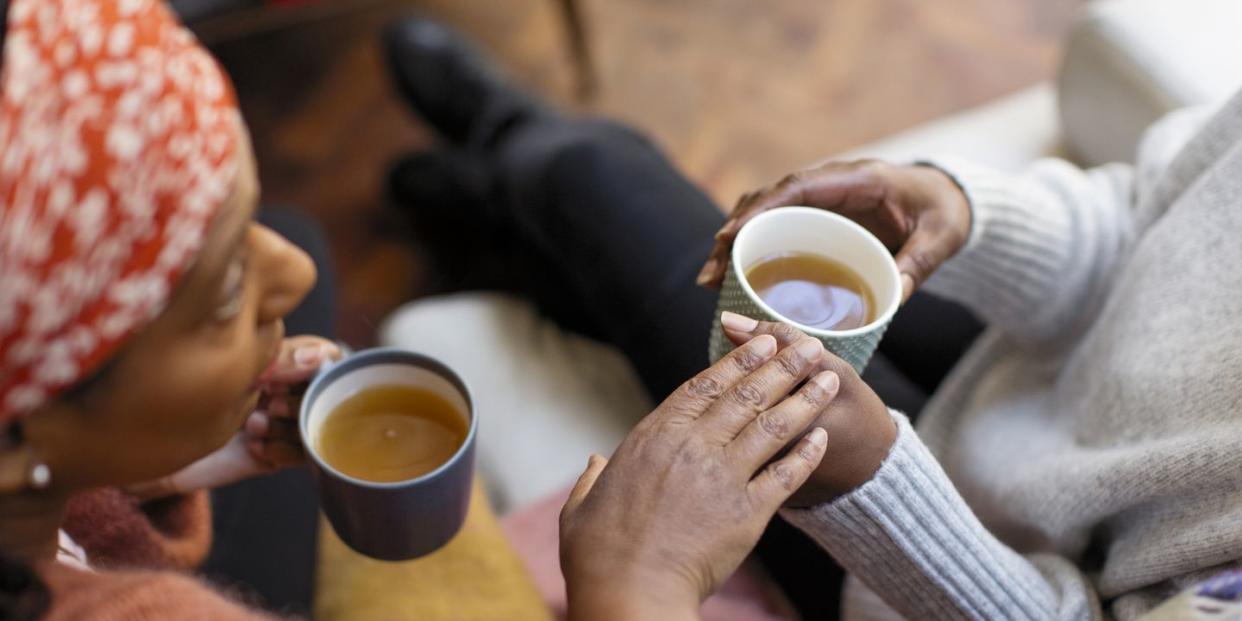8 Responses to “Thank You” That Mean (Even) More Than “You're Welcome”

"Hearst Magazines and Yahoo may earn commission or revenue on some items through the links below."
Any nursery school student knows what to say when someone thanks them for something, whether it’s sharing the blocks or passing the pretzels. “You’re welcome” is the human auto-response, even from the littlest humans. But in language, as in life, it’s nice to mix things up. These alternative phrases are breezy yet gracious and imbue the most common—and often throwaway—of exchanges with a touch of warmth and intention. Give them a whirl, and thank us later.
“Happy to!”
Delighting someone else is one of the great pleasures of being human. This phrase lets the thanker know that they brought you joy by letting you be of service.
“It was my pleasure.”
You watched a friend’s cat. You helped your elderly neighbor bring in the groceries. You baked your famous chocolate chip cookies for someone and loved doing it. If the kindness you extended was a truly enjoyable experience for you, say so.
“I’m so glad you liked it!”
Extra-handy this time of year, this gem works when someone thanks you for a present. It’s not just a nicety; it’s a way to keep a dialogue going. They may now tell you why they liked it. You might share the story of picking it out. (“I wasn’t sure it was your color,” or “It reminded me of our trip to Yellowstone in 10th grade.”) Now a gift exchange isn’t just a transaction; it’s an interaction that reinforces and celebrates your connection.
“I’m so glad it was helpful!”
A variation on the above, this works when you offered a service or kindness rather than a gift. You shared your secret to negotiating for a salary or dealing with a difficult boss—or just gave your time to water someone’s plants while they were away. Your effort made their life a little—or a lot—easier. This phrase lets them know you’re happy for them, and for yourself. And there are infinite variations on it. When someone says “Thank you” to her, says Niro Feliciano, cognitive psychotherapist and author of This Book Won’t Make You Happy, “I like to think about why it was meaningful to that person. Was it helpful? Did it make them feel good?” Then she tailors her response: “I’m glad it made a difference to you.”
“Of course!”
“This is for something that’s almost a mundane action that doesn’t involve a lot of effort on your part,” says Elaine Swann, etiquette expert and founder of the Swann School of Protocol. You open a door for someone, pick up the paper they dropped, tuck in the tag sticking up out of their sweater. It acknowledges that you heard their thanks, and also implies that you wouldn’t think of not doing it, and you’d do the same again in a similar situation.
“It’s an honor!”
This beautiful catchphrase comes courtesy of Swann, who explains, “It’s a grateful statement that allows the conversation to continue and therefore just deepens the relationship and the expression of gratitude.” Keep it in your back pocket for situations where someone thanks you for being at their event, hosting a gathering for them, or being on their team in some way, whether they’re grateful to you for standing up at their wedding or as a colleague at work.
“Any time!”
Don’t say it if you don’t mean it. But if you sincerely would always be happy to pick up their kid or walk their dog, let them know. And get ready for more thanks, because there’s no greater gift than knowing you’ve got someone you can count on if you just say the word.
“You’re most welcome.”
Don’t get us wrong: “‘You’re welcome’ is a great response,” insists etiquette expert Lizzie Post, author of the new Emily Post’s Etiquette—The Centennial Edition. “Accepting gratitude is almost as important as putting it out there in the first place.” But, like a monogrammed hankie, a personalized take on a classic is even better (and in some instances more eleganza) than the original. Adding a simple word—nay, syllable—serves to customize and underscore the phrase, making it clear that the thanks were fully heard, received, and appreciated.
You Might Also Like

